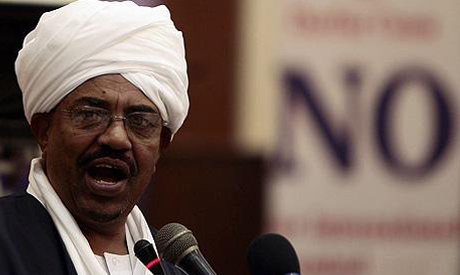
Omar al-Bashir (Photo: Reuters)
Sudanese police fired tear gas on Monday to disperse hundreds of people protesting in the capital Khartoum against the lifting of petrol subsidies by veteran President Omar Hassan al-Bashir.
Bashir, in power since 1989, has avoided an "Arab spring" uprising of the sort that has unseated other rulers in the region but many in Sudan complain about soaring food prices, corruption, violent conflicts and high unemployment.
The government almost doubled prices for fuel and cooking gas on Monday to bring its budget under control. The Arab African country lost three-quarters of its oil reserves - its main source of revenues and of dollars for food imports - when South Sudan became independent in 2011.
Within hours of petrol stations adjusting their price displays, some 800 protesters gathered in the centre of Khartoum, shouting "No, No to price hikes".
Others called on Bashir to resign, yelling "go, go".
Police arrived, firing tear gas to disperse the crowd.
Late on Sunday, Bashir held a televised news conference lasting two hours to defend his abolition of fuel subsidies. He promised to use much of the money saved to help the poor and increase salaries for civil servants.
But many Sudanese have gorwn impatient with years of what they see as economic crises caused by mismanagement and U.S. trade sanctions.
"The government ... has no idea of what people are going through. I am ready to join any protest against the lifting," said 41-year old Ahmed Iassan, an unemployed worker.
A 45-year university professor said he would struggle to make ends meet with the fuel price hikes. 'I really want to leave Sudan," he said, asking not to be named.
Crisis
The government started reducing some fuel subsidies in July 2012. Several weeks of small protests ended with a security crackdown.
It had hoped to sustain the remaining support by boosting gold exports to replace oil revenues, but was thwarted by the recent fall in global gold prices.
Petrol stations in the capital Khartoum raised the price of a gallon (3.8 litres) of petrol on Monday to 21 pounds (almost $3 based on black market prices), from 12 pounds.
A gallon of gasoline now costs 14 pounds, up from 8.5 pounds, petrol station staff said. The prices for a cylinder of cooking gas rose to 25 pounds from 15 pounds.
Sudan produces too little to feed its 32 million people. Even basic food imports such as wheat arrive by ship in Port Sudan, before they get trucked for days across the vast country, spurring food price inflation.
The government claims annual inflation has fallen to 23.8 percent in July from 37.1 percent in May but independent analysts dismiss the figures and put the rate at 50 percent or even higher.
The Sudanese pound is worth barely a third of its value against the dollar on the black market at the time of the south's succession.
Short link: